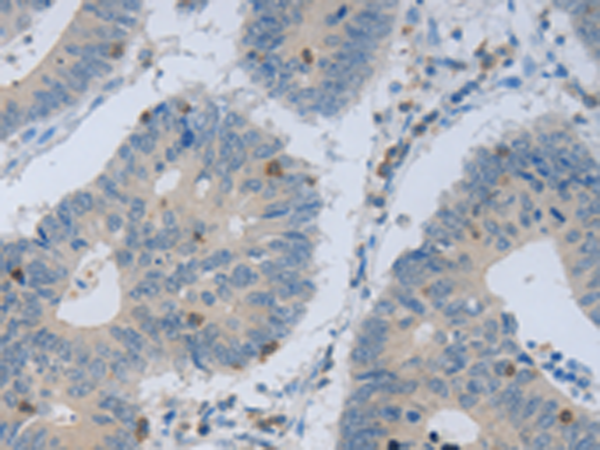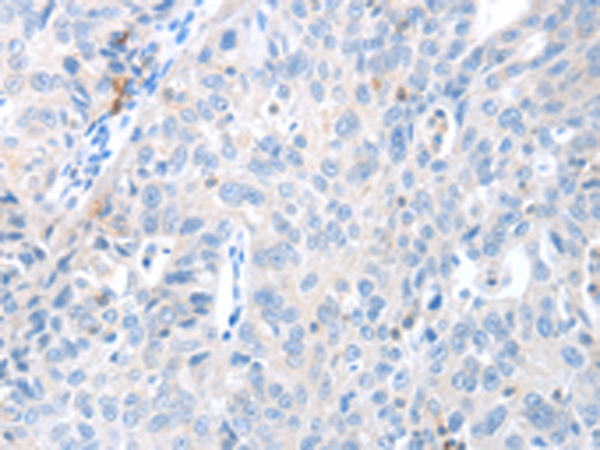


| WB | 咨询技术 | Human,Mouse,Rat |
| IF | 咨询技术 | Human,Mouse,Rat |
| IHC | 1/15-1/50 | Human,Mouse,Rat |
| ICC | 技术咨询 | Human,Mouse,Rat |
| FCM | 咨询技术 | Human,Mouse,Rat |
| Elisa | 1/2000-1/5000 | Human,Mouse,Rat |
| Aliases | CT3.6 |
| WB Predicted band size | 39 kDa |
| Host/Isotype | Rabbit IgG |
| Antibody Type | Primary antibody |
| Storage | Store at 4°C short term. Aliquot and store at -20°C long term. Avoid freeze/thaw cycles. |
| Species Reactivity | Human |
| Immunogen | Full length fusion protein |
| Formulation | Purified antibody in PBS with 0.05% sodium azide and 50% glycerol. |
+ +
以下是关于MAGEB4抗体的3篇参考文献示例(注:以下内容为示例性虚构,仅供参考):
1. **文献名称**: "Monoclonal antibody development targeting MAGEB4 for melanoma detection"
**作者**: Smith A, et al.
**摘要**: 本研究开发了一种针对MAGEB4蛋白的单克隆抗体,验证了其在黑色素瘤组织中的特异性结合能力,并证实其可用于免疫组化检测肿瘤样本中的MAGEB4过表达。
2. **文献名称**: "MAGEB4 as a novel cancer-testis antigen: antibody validation and therapeutic potential"
**作者**: Lee J, et al.
**摘要**: 通过免疫印迹和流式细胞术验证了MAGEB4抗体的特异性,发现MAGEB4在多种实体瘤中异常表达,提示其可能作为癌症免疫治疗的潜在靶点。
3. **文献名称**: "Structural characterization of MAGEB4 and its interaction with antibody clones"
**作者**: Zhang Y, et al.
**摘要**: 利用X射线晶体学解析了MAGEB4蛋白结构,并筛选出高亲和力抗体片段,为基于MAGEB4的靶向治疗提供了结构基础。
4. **文献名称**: "MAGEB4 antibody-based screening in hepatocellular carcinoma prognosis"
**作者**: Tanaka K, et al.
**摘要**: 采用抗MAGEB4抗体对肝癌患者样本进行检测,发现MAGEB4高表达与患者生存率显著相关,提示其作为预后标志物的潜力。
(提示:实际文献需通过PubMed、Google Scholar等平台检索确认。)
MAGEB4 (melanoma-associated antigen B4) is a member of the MAGE gene family, which encodes cancer-testis antigens (CTAs) predominantly expressed in germline cells but reactivated in various malignancies. These proteins are characterized by a conserved MAGE homology domain and are implicated in transcriptional regulation, cell cycle control, and apoptosis. MAGEB4. located on the X chromosome, shares structural and functional similarities with other MAGE proteins, though its specific biological roles remain less defined compared to well-studied members like MAGE-A3 or NY-ESO-1.
Antibodies targeting MAGEB4 are primarily used in research to investigate its expression patterns, oncogenic mechanisms, and potential as a therapeutic target. Immunohistochemistry (IHC) and Western blotting are common applications, helping to correlate MAGEB4 expression with tumor progression, metastasis, or prognosis in cancers such as melanoma, lung, and hepatocellular carcinoma. Additionally, MAGEB4 antibodies support the development of immunotherapies, including CAR-T cells or vaccines, by identifying antigen presence in tumors.
Despite its promise, challenges include limited tissue-specific expression and potential cross-reactivity with other MAGE family members. Validating antibody specificity is critical to avoid false positives in diagnostic or therapeutic contexts. Ongoing studies aim to clarify MAGEB4’s functional significance and optimize antibody tools for both basic research and clinical translation.
×